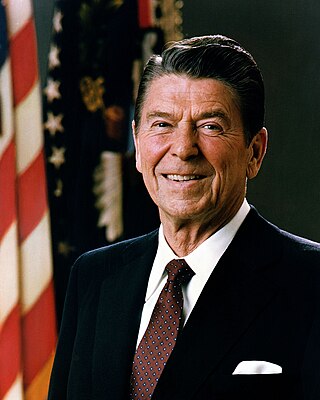
The Intelligence Identities Protection Act of 1982 is a United States federal law that makes it a federal crime for those with access to classified information, or those who systematically seek to identify and expose covert agents and have reason to believe that it will harm the foreign intelligence activities of the U.S., to intentionally reveal the identity of an agent whom one knows to be in or recently in certain covert roles with a U.S. intelligence agency, unless the United States has publicly acknowledged or revealed the relationship.

Executive Order 13292 was an executive order issued by United States President George W. Bush on March 25, 2003, entitled "Further Amendment to Executive Order 12958, as Amended, Classified National Security Information." The Executive Order modified the manner in which sensitive information was handled at the time as set out by President Bill Clinton's 1995 executive order.

The Information Security Oversight Office (ISOO) is responsible to the President for policy and oversight of the government-wide security classification system and the National Industrial Security Program in the United States. The ISOO is a component of the National Archives and Records Administration (NARA) and receives policy and program guidance from the National Security Council (NSC).
Leandro Aragoncillo y Aparente is a former FBI intelligence analyst and a retired United States Marine Corps Gunnery Sergeant who was convicted of spying against the United States Government in 2007. A naturalized Filipino-American, he was charged with espionage and with leaking classified information to the regime of a former Filipino president.

Executive Order 12333, signed on December 4, 1981 by U.S. President Ronald Reagan, was an executive order intended to extend powers and responsibilities of U.S. intelligence agencies and direct the leaders of U.S. federal agencies to co-operate fully with CIA requests for information. This executive order was titled United States Intelligence Activities.
The United States government classification system is established under Executive Order 13526, the latest in a long series of executive orders on the topic of classified information beginning in 1951. Issued by President Barack Obama in 2009, Executive Order 13526 replaced earlier executive orders on the topic and modified the regulations codified to 32 C.F.R. 2001. It lays out the system of classification, declassification, and handling of national security information generated by the U.S. government and its employees and contractors, as well as information received from other governments.

A burn bag is a security bag that holds sensitive or classified documents which are to be destroyed by fire or pulping after a certain period of time. The most common usage of burn bags is by government institutions, in the destruction of classified materials.
Executive Order 11110 was issued by U.S. President John F. Kennedy on June 4, 1963.

The National Economic and Development Authority is an independent cabinet-level agency of the Philippine government responsible for economic development and planning. It is headed by the president of the Philippines as chairman of the NEDA board, with the Secretary of Socioeconomic Planning as vice-chairman. A number of Cabinet members, the Governor of the Bangko Sentral ng Pilipinas, the Chairperson of the Metropolitan Manila Development Authority, the Chief Minister of Bangsamoro, the Secretary of Information and Communications Technology, the Chairman of the Subic–Clark Area Development Corporation, and the National President of the Union of Local Authorities of the Philippines are members of the NEDA Board.
The withdrawal of previously declassified U.S. federal records is a process in which agencies can remove records from public access that they believe were incorrectly declassified and made available to the public at the National Archives and Records Administration. The process is often referred to as "reclassification," but because the records were never properly declassified and remained classified even when made publicly available, they are not re-classified.

President Harry S. Truman signed United States Executive Order 9835, sometimes known as the "Loyalty Order", on March 21, 1947. The order established the first general loyalty program in the United States, designed to root out communist influence in the U.S. federal government. Truman aimed to rally public opinion behind his Cold War policies with investigations conducted under its authority. He also hoped to quiet right-wing critics who accused Democrats of being soft on communism. At the same time, he advised the Loyalty Review Board to limit the role of the Federal Bureau of Investigation (FBI) to avoid a witch hunt. The program investigated over 3 million government employees, just over 300 of whom were dismissed as security risks.

The Presidential Records Act (PRA) of 1978, 44 U.S.C. §§ 2201–2209, is an Act of the United States Congress governing the official records of Presidents and Vice Presidents created or received after January 20, 1981, and mandating the preservation of all presidential records. Enacted November 4, 1978, the PRA changed the legal ownership of the President's official records from private to public, and established a new statutory structure under which Presidents must manage their records. The PRA was amended in 2014, to include the prohibition of sending electronic records through non-official accounts unless an official account is copied on the transmission, or a copy is forwarded to an official account shortly after creation.
The Interagency Security Classification Appeals Panel, or "ISCAP", provides the public and users of the classification system with a forum for further review of classification decisions. ISCAP states in order to foster a well-informed public while simultaneously protecting national security interests, checks and balances are needed over the classification system. This requires that some of the work of the U.S. Government be done outside the purview of its citizenry.

The Classified Information Procedures Act or CIPA is codified as the third appendix to Title 18 of the U.S. Code, the title concerning crimes and criminal procedures. The U.S. Code citation is 18 U.S.C. App. III. Sections 1-16.

Executive Order 12036 is a United States Presidential Executive Order signed on January 24, 1978, by President Jimmy Carter that imposed restrictions on and reformed the U.S. Intelligence Community along with further banning indirect U.S. involvement in assassinations. The EO was designed to strengthen and expand Executive Order 11905, which was originally signed by Gerald R. Ford in 1976.
Executive Order 13526 was issued on December 29, 2009, by United States President Barack Obama. It is one of a series of executive orders from US Presidents outlining how classified information should be handled. It revokes and replaces the previous Executive Orders in effect for this, which were EO 12958 (text) and EO 13292 (text).
Executive Order 13514 was an Executive Order, entitled Federal Leadership in Environmental, Energy, and Economic Performance, which U.S. President Barack Obama issued on October 5, 2009. EO 13514 was replaced by Executive Order 13693, titled Planning for Federal Sustainability in the Next Decade, issued by Obama on March 19, 2015. The Office of the Federal Environmental Executive, whose name was changed to the Office of Federal Sustainability by Executive Order 13693, is housed at the Council on Environmental Quality within the Executive Office of the President of the United States. Its role is to oversee policy, guidance, and implementation of the sustainability Executive Order.

John Napier Tye is a former official of the U.S. State Department who came forward in 2014 as a whistleblower seeking to publicize certain electronic surveillance practices of the U.S. government under Executive Order 12333. He later co-founded a legal organization, Whistleblower Aid, intended to help whistleblowers in multiple sectors forward their concerns without incurring legal liability.
The US Department of Commerce Office of Security is a division of the United States Department of Commerce (DOC) that works to provide security services for facilities of the department. Its aim is to provide policies, programs, and oversight as it collaborates with facility managers to mitigate terrorism risks to DOC personnel and facilities, program managers to mitigate espionage risks to DOC personnel, information, and facilities, and Department and Bureau leadership to increase emergency preparedness for DOC operations.








